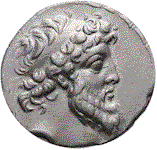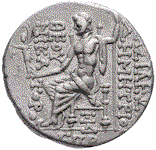The son of Demetrius
I went into exile at age 11, when Alexander
Balas killed his father (150
BCE). In exile he allied himself to
Ptolemy VI & married his daughter, Cleopatra
Thea. Three years later he returned with an army of Cretan mercenaries
raised by his father-in-law & deposed Balas (145
BCE), earning him his
epithet ["the victor"]. But the young king's victory was
short-lived. First he faced a formidable challenge from the rebel general
Trypho who posed as regent for Balas' son Antiochus
VI before usurping the throne for himself. Then, even before Trypho's
defeat, Demetrius' forces had to fend off a Parthian invasion (140
BCE). Demetrius himself was captured (139
BCE) & spent the next
decade as a hostage, leaving his younger brother Antiochus VII to rule his
diminished realm. Released from captivity in 129
BCE, he was briefly
restored to the throne of a divided kingdom until his own assassination.
Demetrius' troubles provided the
opportunity for Johanan
Hyrcanus, the Hasmonean ruler of Jerusalem,
to claim Jewish independence -- which Demetrius acknowledged to gain
Jewish support in his struggle with his rivals -- & to annex Seleucid
territory beyond Judea.
References:
Josephus,
Antiquities 13.86-87,
109-160, 174-187, 218-222, 267-271.
1 Maccabees
10:67-73; 11:8-12,19,28-55; 13:34-40; 14:1-3.
Appian,
History
of Rome: Syrian Wars
67-68.
Other resources on line:
-
1
Maccabees 13 - includes Jewish account of Demetrius'
recognition of Jewish independence [Good News
translation posted by
Bible
Gateway].
![]()
![]()


![]()
![]()
![]() Perspective on the
World of Jesus
Perspective on the
World of Jesus ![]()